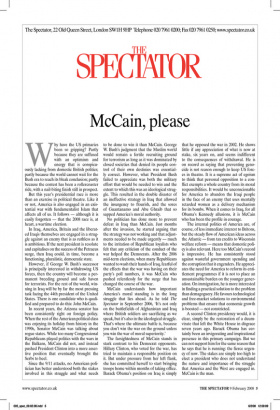McCain, please
Why have the US primaries been so gripping? Partly because they are suffused with an optimism and energy that is conspicuously lacking from domestic British politics; partly because the world cannot wait for the Bush era to reach its bleak conclusion; partly because the contest has been a rollercoaster ride, with a nail-biting finish still in prospect.
But this year’s presidential race is more than an exercise in political theatre. Like it or not, America is also engaged in an existential war with fundamentalist Islam that affects all of us. It follows — although it is easily forgotten — that the 2008 race is, at heart, a wartime election.
In Iraq, America, Britain and the liberated Iraqis themselves are engaged in a struggle against an enemy that is as ruthless as it is ambitious. If the next president is resolute and capitalises on the success of the Petraeus surge, then Iraq could, in time, become a functioning, pluralistic, democratic state.
However, if George W. Bush’s successor is principally interested in withdrawing US forces, then the country will become a permanent breeding ground and safe haven for terrorists. For the rest of the world, winning in Iraq will be by far the most pressing task facing the 44th president of the United States. There is one candidate who is qualified and prepared to do this: John McCain.
In recent years, the Arizona senator has been consistently right on foreign policy. When the rest of the American political class was enjoying its holiday from history in the 1990s, Senator McCain was talking about rogue states. While too many Congressional Republicans played politics with the wars in the Balkans, McCain did not, and instead pushed President Clinton into a more assertive position that eventually brought the Serbs to heel.
Since the 9/11 attacks, no American politician has better understood both the stakes involved in this struggle and what needs to be done to win it than McCain. George W. Bush’s judgment that the Muslim world would remain a fertile recruiting ground for terrorism as long as it was dominated by closed societies that denied its people control of their own destinies was essentially correct. However, what President Bush failed to appreciate was both the military effort that would be needed to win and the extent to which this was an ideological struggle. This resulted in the double disaster of an ineffective strategy in Iraq that allowed the insurgency to flourish, and the sores of Guantanamo and Abu Ghraib that so sapped America’s moral authority.
No politician has done more to prevent defeat in Iraq than McCain. Just months after the invasion, he started arguing that the strategy was not working and that adjustments needed to be made urgently — much to the irritation of Republican loyalists who felt that any criticism of the conduct of the war helped the Democrats. After the 2006 mid-term elections, when many Republicans wanted to wash their hands of Iraq, fearful of the effects that the war was having on their party’s poll numbers, it was McCain who pushed relentlessly for the surge that has changed the course of the war.
McCain understands how important America’s moral standing is in the long struggle that lies ahead. As he told The Spectator in September 2006, ‘It’s not only on the battlefields of Afghanistan and Iraq where British soldiers are sacrificing as we speak, but it’s also in the ideological struggle. That’s where the ultimate battle is, because you don’t win the war on the ground unless you win the war of moral superiority.’ The farsightedness of McCain stands in stark contrast to his Democrat opponents. Hillary Clinton, who voted for the war, has tried to maintain a responsible position on it. But under pressure from her left flank, she has committed herself to start bringing troops home within months of taking office. Barack Obama’s position on Iraq is simply that he opposed the war in 2002. He shows little if any appreciation of what is now at stake, six years on, and seems indifferent to the consequences of withdrawal. He is on record as saying that preventing genocide is not reason enough to keep US forces in theatre. It is a supreme act of egoism to think that personal opposition to a conflict exempts a whole country from its moral responsibilities. It would be unconscionable for America to abandon the Iraqi people in the face of an enemy that uses mentally retarded women as a delivery mechanism for its bombs. When it comes to Iraq, for all Obama’s Kennedy allusions, it is McCain who has been the profile in courage.
The internal politics of America are, of course, of less immediate interest to Britons, but the steady flow of American ideas across the Atlantic — from tax credits to Wisconsin welfare reform — means that domestic policy is also relevant. Here too McCain’s record is impressive. He has consistently stood against wasteful government spending and the corruption that it engenders. He appreciates the need for America to reform its entitlement programmes if it is not to place an unsustainable burden on the younger generation. On immigration, he is more interested in finding a practical solution to the problem than demagoguery. He favours technological and free-market solutions to environmental problems that ensure that economic growth is boosted — not constricted.
A second Clinton presidency would, it is clear, simply be the restoration of a duumvirate that left the White House in disgrace seven years ago. Barack Obama has certainly been an invigorating and inspirational presence in this primary campaign. But we can not support him for the same reason that he says that he is running: the fierce urgency of now. The stakes are simply too high to elect a president who does not understand the nature and importance of the struggle that America and the West are engaged in. McCain is the man.


































































 Previous page
Previous page